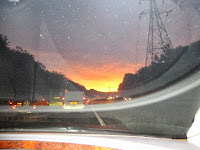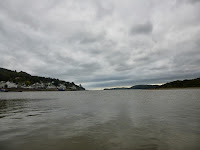Yesterday morning I flew into a
grey, wet and windy Manchester. I was amazed that it
took just 10 minutes, as we came into land to go from sunshine so bright it makes
your eyes hurt to the greyness of the wettest day imaginable. Not that my
spirits were dampened on this occasion. I had just spent a couple of days with
some incredibly creative and welcoming people, and had a visit from my youngest
grandchildren to look forward to later on in the day.
The people I had spent the last
couple of days with were from Saimaa University of Applied Sciences, located in
Lappeenranta, the 13th largest city in Finland. This was not a trip
I had planned. My boss was due to go there and arrangements had been in place
for some time. However, she was unfortunately taken ill, and on Tuesday it
became clear she would not be able to travel. After a conversation with my VC
it was decided that I would go in her place and travel out the following day.
However, Wednesday proved to be a
long day. I had a great meeting with colleagues from the pre-registration nurse
teams. It was an opportunity to re-affirm my personal pledge to regularly experience
every aspect of our Schools activity, from being in a classroom, to practice,
and all things student focused. There were also some positive and constructive HR
meetings aimed at working towards changes in the School. The last meeting of
the day was an extraordinary meeting of the University Senate. This meeting
provided an opportunity to discuss our new University Strategy.
Then it was a dash to Manchester Airport
to take the 18.30 flight to Helsinki. The flight takes only 2 hours, but as
Finland is 2 hours in front of the UK it meant I arrived at 22.30, tired and
wanting only to climb into bed and sleep. However, it was a single room with a
single bed. I can’t remember the last time I slept in a single bed, and it certainly wasn't last Wednesday!
The following morning it was on a
train to Lappeenranta. I travelled with 3 colleagues from Saimaa University.
They had been at a meeting in Helsinki. The 2
hour journey passed so quickly and the discussions were rich in content, humour
and focus. Once in Lappeenranta it was a quick change before taking a tour of the
facilities at the Skinnarila Campus.
This is a new purpose built campus, just 2 years old and located right at the shore
of Lake Saimaa. It was a fantastic setting, and the facilities were first
class.
Dinner
that night was an opportunity to discuss potential collaborations between our Universities
and in particular, inter-disciplinary teaching and research. We ate at the Restaurant
Wanha Makasiini, a great venue, perhaps a tad short of vegetarian options on the
menu, but with a wine list that more than compensated this. Later, I spent an
hour playing catch up with emails and Twitter conversations, many of which
involved colleagues from across the University of Salford interested in being
part of any future collaborations.
Friday
morning was spent meeting a range of practitioners engaged in putting concepts
of integrative care into practice. They had been across to Salford Royal Hospitals
to find out how they were doing it. I was impressed with the way they were
taking forward integrated health and social care services, particularly in the rural
and remote areas of Eastern Finland. I was also treated to a whistle-stop tour
of the South Karelia Emergency
Health Care service – a different scale to many UK services with just 50,000 attendances a year compared to just fewer
than 100,000 patients a year in somewhere like Wigan, Wrighington and Leigh NHS
Trust.
The
reminder of Friday I was engaged with a series of meetings
looking at potential research focused links and opportunities for future collaboration. And by late
Friday evening I was back in Helsinki reflecting on what had been a very
hectic, but rewarding 2 days. I have been visiting Finland for at least the
last 15 years, and I have to say this was one of the best visits ever. I am really
looking to going back in the future and developing our relationship with colleagues
in Saimaa.



















